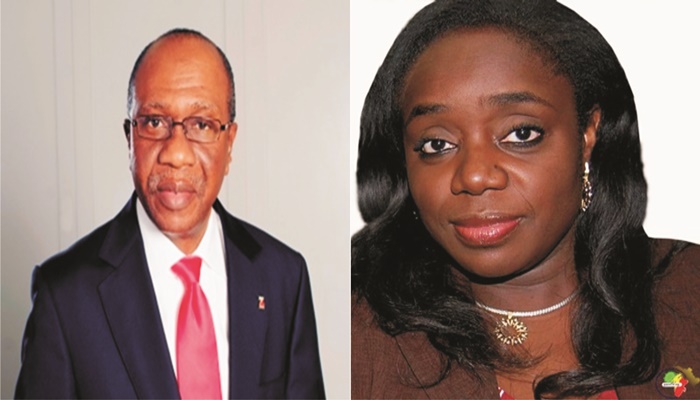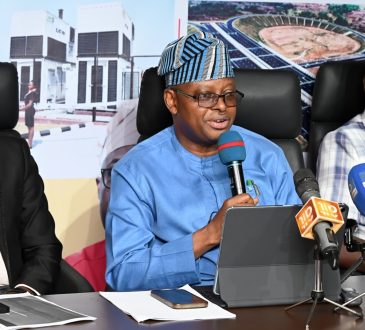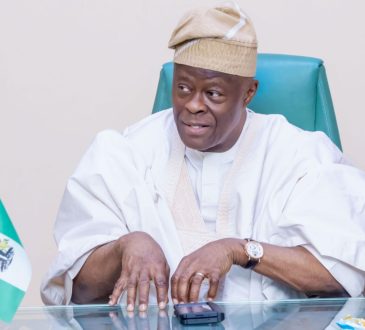
• Experts warn move will cause undue political interference
• Senate invites Emefiele over intervention programmes
• Minister says N6.8b stolen pension funds recovered
• Explains how money in TSA will be spent
The Minister of Finance, Mrs. Kemi Adeosun, yesterday asked for the reduction of the powers of the governor of the Central Bank of Nigeria (CBN). She blamed the extensive powers of the governors for the disconnect between Federal Government’s monetary and fiscal policies. She pleaded with the National Assembly that conferred the powers on the CBN boss, through a legal instrument, to slash them to pave the way for checks and balances.
If this becomes the case, the reaction time of the CBN to monetary upheavals will be greatly impaired as it is expected to act through a supervising agency. In fact, financial experts disagree, saying any such move will result in undue political interference in monetary policies, which will not augur well for the economy. Adeosun made the call yesterday while receiving members of the House of Representatives Tactical Committee on Recession led by Bode Ayorinde.
She said it amounted to what she described as excesses on the part of the apex bank’s governor to decide and act on financial matters without recourse to the minister of finance, who is constitutionally required to supervise financial policies, programmes and activities of the Federal Government.
“I want to correct the impression that the CBN is under us. They are not. Unfortunately, a law was passed, making them independent and giving them more powers. This has resulted in one person having so much power.
“In the time of Prof. Charles Soludo as CBN governor, he went to the National Assembly asking for more powers and you can see where that has taken us to. So we are back to the legislature to help us correct this problem of too much power. As a result, there are no checks and balances,” she said.
Under the administration of former President Goodluck Jonathan, the then CBN governor ordered the sacking and trial of bank chiefs and introduced monetary policies to regulate certain activities in the financial sector.
But none of the CBN governors – including the incumbent, Godwin Emefiele, and former ones, Sanusi Lamido Sanusi, and Charles Soludo, picked their calls or responded to text messages from The Guardian to them. Soludo, whom Adeosun identified as the chief protagonist of the current impasse, in a text message response, merely said: “Sorry, I am abroad and can only be reached via text please.”
But industry analysts like the Director-General, West African Institute for Financial and Economic Management, Prof. Akpan Ekpo, said such an idea should be thrown out immediately, as it was outdated and out of sync with modern global trends.
“I have no details, but if this is actually what she said, it is not acceptable. The Central Bank should remain independent and not be brought under the Ministry of Finance. Nigeria is too large and not equipped for that arrangement. The CBN should not be seen as a subset of the ministry,” he said.
Erstwhile banker and financial expert, Fola Adeola, reinforcing the CBN’s autonomy as a global practice, said the relationship between the ministry and CBN should be the coordination of monetary and fiscal policies.
“While I do not know exactly what she said and meant, but if the move is to reduce CBN’s powers, it may be tantamount to an infringement on its autonomy. On the other, if the matters in question are anything other than monetary policy issues, she may have a case to make,” he said.
The Deputy Managing Director of financial services advisory firm, Afrinvest Limited, Victor Ndukauba, is more concerned about how the adverse impact it would have on the larger economy by subjecting the CBN to the ministry’s supervision.
Standard & Poor’s affirms Nigeria’s B/B rating On March 22, 20176:22 amIn NewsComments By Babajide Komolafe Standard andPoor’s, yesterday, retained Nigeria’s sovereign credit rating at B/B, stable economic outlook. In a statement, the company projected that Nigeria’s economy will grow by 1.5 percent in 2017 and by 3.4 percent by 2020. The company said: “The ratings on Nigeria are constrained by our view of its low level of economic wealth, real GDP per capita trend growth rates below those of peers with similar levels of development, and future policy responses that may be difficult to predict due to the highly centralised political environment. “We expect Nigeria’s economy to achieve real GDP growth by improve-ments in the oil sector and improved government budget execution under its recently-released Economic Recovery and Growth Plan 2017-2020.”
Source: The Guardian.






